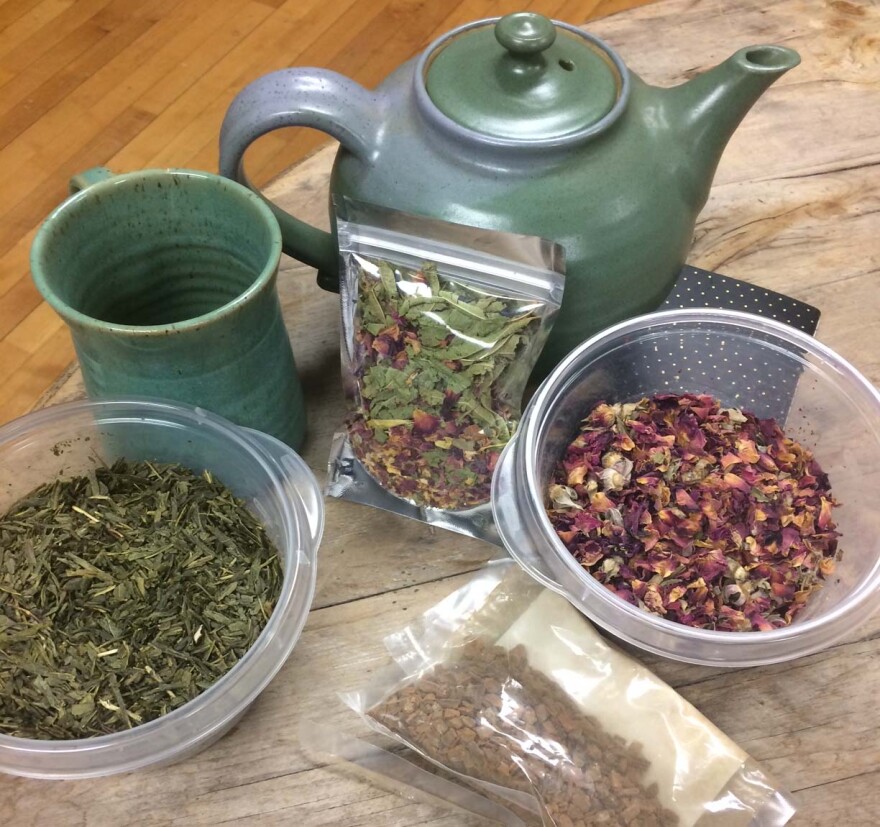As a diehard coffee drinker, I’m about to confess something I was shocked to discover for myself: Tea is amazing – even more so than my beloved bean beverage.

This is not a conclusion I came to willingly. Making a press-pot of dark and bitter coffee each morning is a favorite ritual. How could I start the day by dunking a flimsy tissue envelope of ground-up leaves into water that barely changes color?
What’s more, I've found coffee in the Queen City to be superlative in the last few years, as numerous artisanal roasters and master baristas have brought their products and skills to the region.
There’s only one explanation for my radical reversal: Tea, and the people who truly understand it, snuck up on me and enfolded me in their fragrant and powerful world.
First, the basics according to culinarian Nandita Godbole, who hails from India, a country that consumes plenty of tea. “All varieties of teas come from one basic plant: Camellia sinensis. There are some cultivars (varieties) here and there but the methods of harvesting, oxidation and processing of the tea leaves yields different kinds of tea,” she explained.
Steeping herbs and flowers results in a beverage known as a tisane, even though it’s common to use tea when describing either.

At a recent tea-blending workshop in Charlotte, tea expert Jodi Helmer walked newbies through the basics. She set out containers and invited the group to sample and combine from ingredients that ranged from strong scents and flavors (cinnamon, cloves, and anise) to those that were more delicate (calendula, chamomile, and lemon verbena).
I scooped up tiny rose petals and mixed them with lavender and orange peel – only to realize to my dismay that I had created potpourri, the stuff you put in a bowl to make a room smell good.
Still, Helmer encouraged me to taste the blend. I added hot water, let it steep, and it surprised me. Instead of a heavy floral flavor, it was subtle and sublime.
“The most important thing to have is a sense of adventure and a willingness to try new things," Helmer said. "You might not like every brew you create and that’s OK; the more you play with different herbs, the better sense you get for what you love."
Helmer's book, Growing Your Own Tea Garden, is a valuable resource for anyone looking for solid information and creative ideas. As a fairly freewheeling cook, I had failed to see the parallel to tea blending until Helmer told me, “Some people like cooking and trying different recipes for their meals; I like playing around with different herbs and flavor combinations for teas.”

With my new appreciation for tea – and an annoying cold – now underway, I visited Birch Fine Tea in the Camp North End development. Owners Kristina Coughlin and Alena Goncharov are sisters who grew up in Ukraine, another region with a strong tea-drinking culture (and a culture of drinking strong tea).
"We have nothing against coffee but Charlotte is saturated," Coughlin said. "We wanted to highlight the versatility of the tea leaf and all it has to offer."
Alongside the more fanciful varieties such as "mango tango" and "golden apple spice" that are among more than 100 combinations blended just for the shop, the shelves contain functional teas that claim to boost immunity, cognitive health and fertility. I caught myself being skeptical that something other than a pill could affect health, but then remembered that herbal medicine predated modern treatment modalities by thousands of years.
Coughlin walked me through the rooibos teas that are being studied for their antioxidant properties. She encouraged me to sniff the pu’erh teas, which are fermented and have a complex scent that’s earthy and hard to describe.
"It’s an acquired taste," she said.
So were oysters, whiskey, and even coffee before I learned to love them.
Maybe it was a placebo effect, but as I sipped from my cup of Echinacea-strawberry-blackberry-holy basil-and other ingredients, I think I actually started feeling better.

According to Godbole, "The amount of caffeine, the brewing time or the steeping time (which produces tannin), addition of herbs, spices, sugars, dairy/cream -- all influence how your body will respond to the tea."
Whatever combination was in this cup on this day worked.
Whether it’s the history, science, lore, or something mysterious that might be called, for lack of a better word, magic, I can’t deny that I’ve fallen hard for tea. I doubt I’ll give up coffee completely, but there’s a teapot on the shelf next to the press-pot, now. And the pantry has some little envelopes of different herbs and leaves just waiting to be steeped, sometime very soon.
Amy Rogers writes WFAEats, a fun adventure where we explore all things tasty and tackle the meatier side of the food scene in and around Charlotte.






